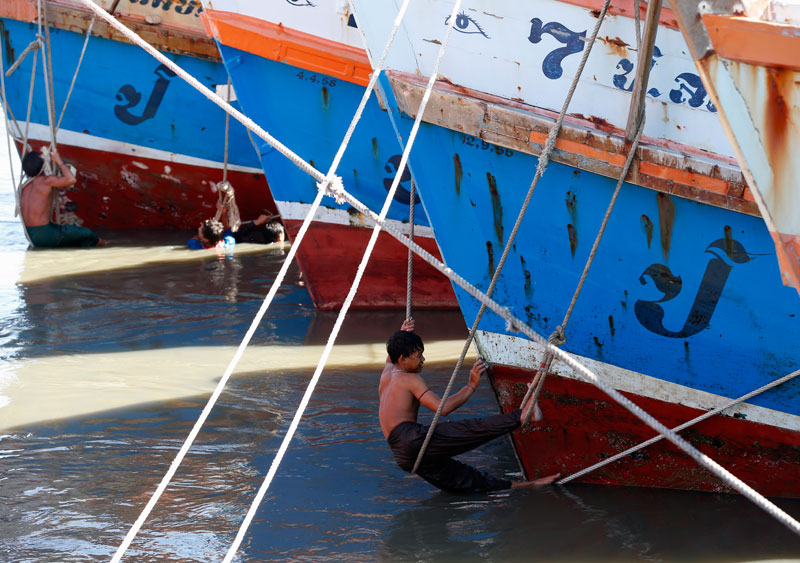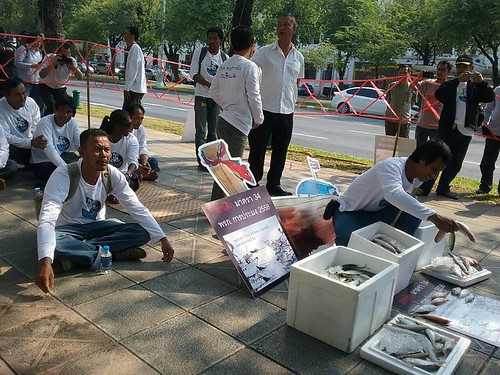illegal, unreported and unregulated fishing
EU gives six more months to tackle IUU fishing woes
JITRAPORN SENWONG
January 23, 2016

The European Union's delegate, Cesar Deben (R) leaves after a meeting with Thai Deputy Prime Minister and Defense Minister at the Ministry of Defence in Bangkok, Thailand, 22 January 2016.
Thailand told to take eight measures; Prawit tells visiting team country has done its best.
THE EUROPEAN Union has given Thailand another six months to solve the problem of illegal, unreported and unregulated (IUU) fishing and urged authorities to widen the crackdown on use of illegal labour in other sectors.
Cesar Deben, a senior EU official, yesterday met Deputy Prime Minister Prawit Wongsuwan to follow up on the progress of Thai measures to address the IUU issue after the union had issued a yellow-card warning in April last year.
The EU representative also forwarded an eight-point feedback to Prawit regarding the efforts to solve the IUU problem, while pointing to human trafficking as another related key issue.
Overall, the EU team said it was satisfied with Thailand's actions over the past eight to nine months to solve the IUU problem and would continue to monitor progress closely over the next six months before making a decision.
According to the team, Thai authorities should strictly enforce the new laws on fishing practices so that criminal and other cases could be brought against wrongdoers.
Second, fishing vessels and companies that commit wrongdoing should face sanctions. Third, the Thai government should send a clear message to the international community on its measures against violators.
In addition, the EU has suggested that Thailand widen its crackdown against the use of illegal labour in other sectors of the economy besides the fisheries industry, while improving the working conditions and welfare for Thai and migrant workers.
On human trafficking, Thai authorities have been urged to monitor Thai-registered fishing vessels that operate in other countries' territorial waters to ensure that they follow international laws.
The EU team said Thai authorities should speed up action against some seafood-processing plants that are still violating labour laws.
Regarding fishing activities within the country's territorial waters by local fishermen who are now restricted to within 3 nautical miles instead of the previous 12 nautical miles, Thai authorities were asked to pursue close consultations with local communities to resolve the IUU problem.
The EU team expressed hope that there would be clearer results in the next six months on the IUU issue while the Thai side said its measures are aimed at long-term solutions based on international laws, the EU's recommendations and Thailand's new fisheries laws.
At this stage, Thai authorities are |stepping up their public relations |campaign so that fishermen and related parties have a better understanding of the situation.
So far, there have been positive signs concerning the various measures taken by Thai authorities and the EU also suggested that Thailand should inform the international community about its actions.
Panitan Wattanayakorn, adviser to Prawit, who is also defence minister, said the government had assured the EU team of its intention to go ahead with measures to solve the IUU problem.
"The EU is satisfied but we will have to continue tackling the problem for another six months, while it's up to the EU to make its decision afterwards. We also expect significant progress, especially in terms of cases [against wrongdoers] in the next two to three weeks," he said.
Prawit said Thailand would continue its efforts to solve the IUU problem but he was not sure when the EU would remove the warning on Thailand.
He said there would be specific measures to deal with fishing vessels that violated international laws in foreign countries' territorial waters.
"We have been tackling this problem, but it's not enough in terms of the problem in other countries' territorial waters and the use of illegal and child labour," he said.
He added that at this stage there was no clear indication from the EU when the yellow-card warning would be removed.
nationmultimedia.com
EU gives six more months to tackle IUU fishing woes
JITRAPORN SENWONG
January 23, 2016

The European Union's delegate, Cesar Deben (R) leaves after a meeting with Thai Deputy Prime Minister and Defense Minister at the Ministry of Defence in Bangkok, Thailand, 22 January 2016.
Thailand told to take eight measures; Prawit tells visiting team country has done its best.
THE EUROPEAN Union has given Thailand another six months to solve the problem of illegal, unreported and unregulated (IUU) fishing and urged authorities to widen the crackdown on use of illegal labour in other sectors.
Cesar Deben, a senior EU official, yesterday met Deputy Prime Minister Prawit Wongsuwan to follow up on the progress of Thai measures to address the IUU issue after the union had issued a yellow-card warning in April last year.
The EU representative also forwarded an eight-point feedback to Prawit regarding the efforts to solve the IUU problem, while pointing to human trafficking as another related key issue.
Overall, the EU team said it was satisfied with Thailand's actions over the past eight to nine months to solve the IUU problem and would continue to monitor progress closely over the next six months before making a decision.
According to the team, Thai authorities should strictly enforce the new laws on fishing practices so that criminal and other cases could be brought against wrongdoers.
Second, fishing vessels and companies that commit wrongdoing should face sanctions. Third, the Thai government should send a clear message to the international community on its measures against violators.
In addition, the EU has suggested that Thailand widen its crackdown against the use of illegal labour in other sectors of the economy besides the fisheries industry, while improving the working conditions and welfare for Thai and migrant workers.
On human trafficking, Thai authorities have been urged to monitor Thai-registered fishing vessels that operate in other countries' territorial waters to ensure that they follow international laws.
The EU team said Thai authorities should speed up action against some seafood-processing plants that are still violating labour laws.
Regarding fishing activities within the country's territorial waters by local fishermen who are now restricted to within 3 nautical miles instead of the previous 12 nautical miles, Thai authorities were asked to pursue close consultations with local communities to resolve the IUU problem.
The EU team expressed hope that there would be clearer results in the next six months on the IUU issue while the Thai side said its measures are aimed at long-term solutions based on international laws, the EU's recommendations and Thailand's new fisheries laws.
At this stage, Thai authorities are |stepping up their public relations |campaign so that fishermen and related parties have a better understanding of the situation.
So far, there have been positive signs concerning the various measures taken by Thai authorities and the EU also suggested that Thailand should inform the international community about its actions.
Panitan Wattanayakorn, adviser to Prawit, who is also defence minister, said the government had assured the EU team of its intention to go ahead with measures to solve the IUU problem.
"The EU is satisfied but we will have to continue tackling the problem for another six months, while it's up to the EU to make its decision afterwards. We also expect significant progress, especially in terms of cases [against wrongdoers] in the next two to three weeks," he said.
Prawit said Thailand would continue its efforts to solve the IUU problem but he was not sure when the EU would remove the warning on Thailand.
He said there would be specific measures to deal with fishing vessels that violated international laws in foreign countries' territorial waters.
"We have been tackling this problem, but it's not enough in terms of the problem in other countries' territorial waters and the use of illegal and child labour," he said.
He added that at this stage there was no clear indication from the EU when the yellow-card warning would be removed.
nationmultimedia.com










Comment